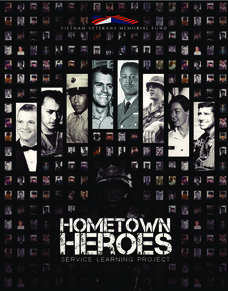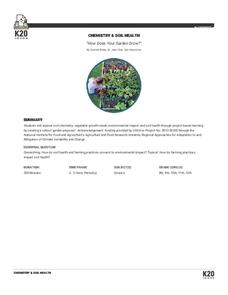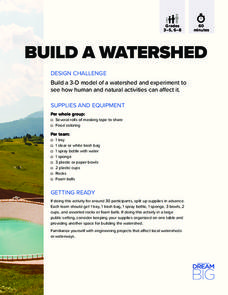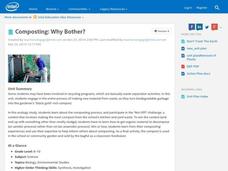Stanford University
Observing Human Rights Day
How much intervention is appropriate for America to take in cases of human rights violations? Class members ponder a question that has lingered since the birth of America with a series of primary sources that reflect the degree to which...
Center for Technology in Teaching and Learning
MedMyst Mission 3: Nemesis at Neuropolis
Calling all science sleuths! A patient appears to have a disease eradicated years ago—how do you treat it? Scholars must research the illness, the possible causes, and find a cure before the disease spreads and wipes out the entire city....
Center for Technology in Teaching and Learning
MedMyst Mission 1: Orientation at O.R.B.
A dozen years after a great plague wipes out the majority of Earth's civilization, a group of scientists joins together to fight infectious diseases. Scholars join the training mission and learn about viruses, bacteria, pathogens and...
California Academy of Science
Optimal and Sustainable: Renewable Energy Revamp
More than 100 cities around the world have shifted from fossil fuels to renewable energy sources. Scholars investigate a city wanting to make this switch, but needs help determining how to make the shift. Groups consider all options,...
California Academy of Science
Building Better Buses: Transportation Design Challenges
Scholars learn about a series of three challenges when they design a bus system for a small town. They determine the bus routes and then figure out the best type of fuel to use before considering the cost of going electric. Learners...
iCivics
Step Nine: Action Campaign
It's time to take action! Learners strategize their action campaigns by using the resource and past brainstorming activities from the series that help them pinpoint problems in their communities. They use included templates to get the...
Smithsonian Institution
The Soldier’s Experience—Vietnam versus World War I
The Vietnam War and World War I were two very important—and different—wars. To understand the differences, and similarities, class members watch videos, examine primary source documents, and then create a newscast that examines the...
Smithsonian Institution
Changing Gender Roles on the Home Front
Many historians discuss how gender roles changed because of World War II, but how did this come to be? An informative resource challenges scholars to do some digging and research the information for themselves. They research how...
US Holocaust Museum
Time Capsule in a Milk Can
Imagine dumping out a milk can and finding letters from one of the darkest moments in history! Scholars use Holocaust Reading Passages and research to discover how people recorded and hid history during the events of World War II. They...
Vietnam Veterans Memorial Fund
Hometown Heroes
Transform studying about veterans in a textbook to personal interviews with veterans in the community. Four varying lesson plans make up an entire unit or individualized learning based on your class's needs. Exercises include researching...
Montana State University
Ice in Action
Make your own bite-size glacier! A resource teaches about the formation and melting of ice. Activities include videos, a hands-on activity where your pupils build glaciers, and a photographic analysis to teach individuals the chilling...
PBS
Women's History: Parading Through History
Want to teach your pupils about debate, effective speech techniques, propaganda, and the women's movement? The first in a sequential series of three, scholars analyze real propaganda images from the the historic women's movement, view a...
K20 LEARN
How Does Your Garden Grow?
Seventy thousand different types of soil exist in the United States alone. Young scientists learn about the importance of soil to the food supply. They test soil for a variety of factors and determine the best place to set up a community...
PBS
Universal Declaration of Human Rights
What rights are guaranteed to students? Do they align with the Universal Declaration of Human Rights, which was approved by the United Nations in 1948? Middle and high schoolers present persuasive arguments about the rights they believe...
PBS
Master of the Airwaves: How FDR Used Radio to Ease the Public’s Fears
The political and economic climate during the 1930's was uncertain and tumultuous. But Americans' minds and hearts were eased with the reassuring words of their president, Franklin D. Roosevelt, and addresses over the radio. High...
PBS
President Theodore Roosevelt: Foreign Policy Statesman or Bully?
Can a negative perception of a president's foreign policy harm his or her historical legacy? A project that winds the clock back to the date of Theodore Roosevelt's death puts students at the editorial desk of a fictional newspaper....
DiscoverE
Build a Watershed
What's the best way to learn how watersheds work? Build one! Combining engineering, the water cycle, and ecology concerns, the activity is the perfect fit for an interdisciplinary unit. Teams construct a model watershed with simple...
DiscoverE
Build a Bobsled Racer
Host a design challenge of Olympic proportion! Junior engineers build their own bobsleds using simple materials. The activity focuses on kinetic and potential energy and how the center of mass affects motion on a downhill track....
Intel
Forensics: Get a Clue
Although the methods are all scientific, forensic science was started by police officers rather than scientists, who relied on observation and common sense. Young detectives use many tools to solve crimes around the school in a...
Intel
Composting: Why Bother?
The first STEM lesson in a group of 10 explores composting. After discussing how to make a better tomorrow, classes are challenged to track garbage in their communities, visit a local waste management facility, and conduct a survey...
New York City Department of Education
Egypt
This six-week unit encompasses all subjects with a focus study on world history and the development of ancient civilizations. As gifted and talented students dive into the interesting yet challenging topic of Egypt, they...
PwC Financial Literacy
Planning and Money Management: Spending and Saving
Financial literacy is such an important, and often-overlooked, skill to teach our young people. Here is a terrific lesson which has pupils explore how to come up with a personal budget. They consider income, saving, taxes, and their...
NASA
Einstein and His Times
Scholars research and present on the historical happenings of 1919. After sharing their findings, pupils debate about how Congress dealt with the moral issues of the time. The evaluation asks learners to write a persuasive...
Chemical Education Foundation
Teacher's Guide to Science Projects
Do you find the idea of having a science fair with all of your students intimidating? Use a guide that provides everything you need to know to make project-based learning manageable. The resource includes options for four...

























